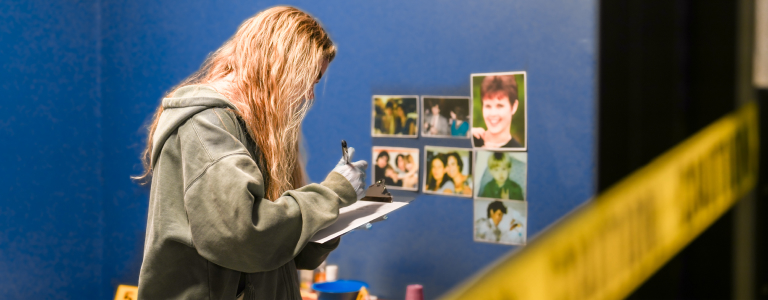Criminal Justice

Overview
The Quincy College Criminal Justice Program is designed to prepare individuals for the various aspects of Criminal Justice in the region. The program options available to students offer several routes of preparation. In any Criminal Justice course, students may find themselves in classrooms with police officers, private security professionals, government agency staff, and prospective social scientists. Students are encouraged to carefully review each Criminal Justice track, and the options available within each, in order to more effectively identify the program best suited for their career and personal goals.
The Criminal Justice Associate Degree is designed to prepare students for entry level positions in the criminal justice profession as well as to facilitate transfer to a Baccalaureate Degree-granting institutions and enhance the likelihood of students’ success in those programs. The Criminal Justice Associate Degree allows the student greater flexibility in selecting courses that will match the program requirements of the school to which the student intends to transfer.
Program Outcomes
At the completion of this program, the student will able to:
- Outline criminal justice policies and practices applied in the administration of justice.
- Describe how criminological theory supports problem solving and examination into the nature and causes of crime.
- Estimate the impact of criminal justice technology upon due process and equal justice.
- Describe contemporary threats, challenges, and social issues impacting the administration of justice.
- Summarize the evolution of the correctional system and community-based alternatives to incarceration.
- Illustrate major qualitative and/or quantitative methods used in criminal justice research.
Academic Division of Professional Programs
Criminal Justice Courses
-
Code
Course
Credits
-
- CJS 101
Introduction to Criminal Justice
- 3
-
- CJS 103
Criminology
- 3
-
- CJS 104
Law Enforcement & Society
- 3
-
- CJS 105
Criminal Evidence & Investigation
- 3
-
- CJS 107
Juvenile Delinquency
- 3
-
- CJS 108
Criminal Justice Ethics
- 3
-
- CJS 109
Criminal Law
- 3
-
- CJS 111
Criminal Justice Administration
- 3
-
- CJS 113
Drugs and Society
- 3
-
- CJS 117
Crisis Intervention & the Police
- 3
-
- CJS 121
Criminal Procedure
- 3
-
- CJS 202
Introduction to Corrections
- 3
-
- CJS 204
Probation, Parole & Community Corrections
- 3
-
- CJS 211
Introduction to Security Procedures
- 3
-
- CJS 215
White-Collar Crime
- 3
-
- CJS 221
Domestic Violence, Abuse & Neglect
- 3
-
- CJS 224
Unequal Justice: Gender, Race, Ethnicity, Class & the Law
- 3
-
- CJS 225
Victimology
- 3
-
- CHE 103
Introduction to Forensic Science
- 4
-
- ENG 101
English Composition I
- 3
-
- ENG 102
English Composition II
- 3
-
- HSV 200
Human Behavior and the Social Environment
- 3
-
- HSV 205
Substance Addiction Counseling
- 3
-
- HSV 251
Introduction to Substance Addiction Studies
- 3
-
- HSV 260
Diverse Populations
- 3
-
- SOC 101
General Sociology
- 3
-
- SOC 102
Contemporary Social Problems
- 3
-
- PSY 101
General Psychology
- 3
-
- MAT 107
Statistics
- 3
-
- IDS 167
First Year Seminar
- 3
-
- EXP 397
Internship
- 3

View Current Semester Courses>>
Start your education at Quincy College this fall. Our online and blended curriculum makes it easy for you to stay safe and earn your degree!
You might also be interested in...
-

Criminal Justice: Law Enforcement
The Criminal Justice: Law Enforcement Program is designed to prepare students for entry-level positions in the criminal justice profession.
-

Criminal Justice 3+1 Joint Admissions Program
Quincy College’s Criminal Justice 3+1 program offers joint admissions with Curry College, allowing students to complete an Associate’s and Bachelor’s
-

Online Learning
Quincy College Online Courses & Degrees | Conveniently complete courses anytime and any place.
-

Courses
View the current course schedule. Quincy College offers the programs you want, the flexibility you need and the price that makes it all possible.
